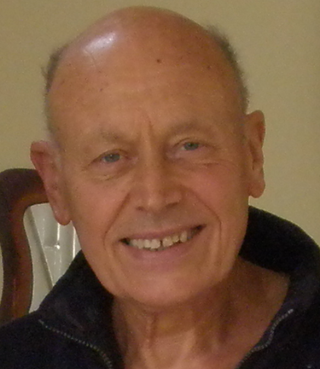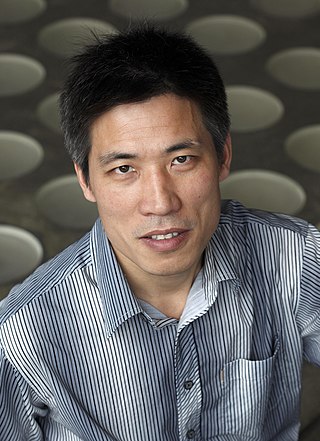
George Porter, Baron Porter of Luddenham, was a British chemist. He was awarded the Nobel Prize in Chemistry in 1967.

Sir Geoffrey Wilkinson FRS was a Nobel laureate English chemist who pioneered inorganic chemistry and homogeneous transition metal catalysis.

James Barber was a British senior research investigator and emeritus Ernst Chain professor of biochemistry at Imperial College London, Visiting Professor at the Polytechnic University of Turin and Visiting Canon Professor to Nanyang Technological University (NTU) in Singapore.
Jeremy Keith Morris Sanders is a British chemist and Emeritus Professor in the Department of Chemistry at the University of Cambridge. He is also Editor-in-Chief of Royal Society Open Science. He is known for his contributions to many fields including NMR spectroscopy and supramolecular chemistry. He served as the Pro-Vice-Chancellor for Institutional Affairs at the University of Cambridge, 2011–2015.

Anthony Gerard Martin Barrett FRS, FMedSci is a British chemist, and Sir Derek Barton Professor of Synthesis, Glaxo Professor of Organic Chemistry at Imperial College London. He is Director of the Wolfson Centre for Organic Chemistry in Medical Science. He was elected a fellow of the Royal Society in 1999 and Academy of Medical Sciences in 2003. He obtained a BSc as well as PhD from Imperial College London in 1973 and 1975 respectively.

Andrew Bruce Holmes is an Australian and British senior research chemist and professor at the Bio21 Institute, Melbourne, Australia, and the past President of the Australian Academy of Science. His research interests lie in the synthesis of biologically-active natural products and optoelectronic polymers.

Jenny Nelson is Professor of Physics in the Blackett Laboratory and Head of the Climate change mitigation team at the Grantham Institute - Climate Change and Environment at Imperial College London.

Alfred William Rutherford is Professor and Chair in Biochemistry of Solar energy in the Department of Life sciences at Imperial College London.

Nicola Armaroli is an Italian chemist, research director at the Italian National Research Council (CNR), director of the scientific magazine Sapere and member of the Italian National Academy of Sciences.

Benjamin Guy Davis is Professor of Chemical biology in the Department of Pharmacology and a member of the Faculty in the Department of Chemistry at the University of Oxford and a Fellow of Pembroke College, Oxford. He holds the role of Science Director for Next Generation Chemistry (2019-2024) and Deputy Director (2020-) at the Rosalind Franklin Institute.

Henry James Snaith is a professor in physics in the Clarendon Laboratory at the University of Oxford. Research from his group has led to the creation of a new research field, based on halide perovskites for use as solar absorbers. Many individuals who were PhD students and postdoctoral researchers in Snaith's group have now established research groups, independent research portfolios and commercial enterprises. He co-founded Oxford Photovoltaics in 2010 to commercialise perovskite based tandem solar cells.

Eugenia Eduardovna Kumacheva is a University Professor and Distinguished Professor of Chemistry at the University of Toronto. Her research interests span across the fields of fundamental and applied polymers science, nanotechnology, microfluidics, and interface chemistry. She was awarded the L'Oréal-UNESCO Awards for Women in Science in 2008 "for the design and development of new materials with many applications including targeted drug delivery for cancer treatments and materials for high density optical data storage". In 2011, she published a book on the Microfluidic Reactors for Polymer Particles co-authored with Piotr Garstecki. She is Canadian Research Chair in Advanced Polymer Materials. She is Fellow of the Royal Society (FRS) and a Fellow of the Royal Society of Canada (FRSC).

Iain McCulloch is Professor of Polymer Chemistry, in the Department of Chemistry, at the University of Oxford, UK, a fellow and tutor in chemistry at Worcester College, and an adjunct professor at King Abdullah University of Science and Technology (KAUST), Saudi Arabia, and a visiting professor in the Department of Chemistry at Imperial College London.
Andrew R. Barron is a British chemist, academic, and entrepreneur. He is the Sêr Cymru Chair of Low Carbon Energy and Environment at Swansea University, and the Charles W. Duncan Jr.-Welch Foundation Chair in Chemistry at Rice University. He is the founder and director of Energy Safety Research Institute (ESRI) at Swansea University, which consolidates the energy research at the University with a focus on environmental impact and future security. At Rice University, he leads a Research Group and has served as Associate Dean for Industry Interactions and Technology Transfer.
Charlotte Williams holds the Professorship of Inorganic Chemistry at the University of Oxford. Her research focuses on the synthesis of novel catalysts with an expertise in organometallic chemistry and polymer materials chemistry.

Stanley William Herbert Cowley is a British physicist, Emeritus Professor of Solar Planetary Physics at the University of Leicester.

Natalie Stingelin, Fellow of the Materials Research Society and Royal Society of Chemistry, is a materials scientist and current chair of the School of Materials Science and Engineering at the Georgia Institute of Technology, the University of Bordeaux and Imperial College. She led the European Commission Marie Curie INFORM network and is Editor-in-Chief of the Journal of Materials Chemistry C and Materials Advances.
Matthew John Fuchter is a British chemist who is a Professor of Chemistry at Imperial College London. His research focuses on the development and application of novel functional molecular systems to a broad range of areas; from materials to medicine. He has been awarded both the Harrison-Meldola Memorial Prize (2014) and the Corday–Morgan Prizes (2021) of the Royal Society of Chemistry. In 2020 he was a finalist for the Blavatnik Awards for Young Scientists.

Junwang Tang, MAE, FRSC and FIMMM, is the Founding Director of Industrial Catalysis Center, and Carbon Neutrality Chair Professor of Materials Chemistry and Catalysis at the Department of Chemical Engineering, Tsinghua University and Visiting Professor at University College London (UCL). He also served as the Director of the University Material Hub at UCL (2016–2019).

Ana Flávia Nogueira is a Brazilian chemist who is a Full Professor at the State University of Campinas (Unicamp) since 2004. Her research considers nanostructured materials for solar energy conversion. She was elected to the Brazilian Academy of Science in 2022.
















